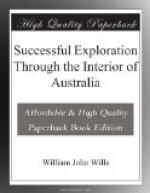I have the honour to forward the following particulars gathered from the blacks, seeming to refer to Mr. Burke and party. A black fellow called Sambo, who has lately come in from Lake Hope, brought with him the hair of two white men, which he showed to the cook and stockman at Tooncatchin. He says it was given to him by other blacks, who told him that there were white men living much farther out than where he had been. Frank James, one of Mr. Butler’s stockmen, saw Sambo again on the 6th instant, and tried to get the hair from him. He had unfortunately given it away to other blacks. James promised him tobacco for it, and he has promised to get it again. Sambo says that the white men are naked, have no firearms or horses, but animals which from his description are evidently camels; that they sleep on a raft, which they build on the water. They live on fish which they catch with nets made with grass. Sambo says that the other blacks had told him that the white men arrived there this winter. According to Sambo, the people are twenty sleeps from Tooncatchin, by way of Lake Hope Creek. I do not think that these sleeps on the average exceed ten miles, so it is probable that they are on or near Cooper’s Creek. Sambo is quite willing to go out all the way with a party of white men. He also says that the blacks on Lake Hope Creek are afraid of these white men. I received the above information from Mr. H. Butler, Frank James, and Cleland, on my arrival at Blanche on the 8th instant. Knowing that Mr. McKinlay and party were on their way, I accordingly left Blanche on the 9th, and I met Mr. McKinlay and party to-day on Bandnoota Plain, 145 miles south of Blanche, when I put that gentleman in possession of the above particulars.
I have etc.
James Howe, Police Trooper.
To George Hamilton, Esquire, J.P., Inspector of Police.
The Surveyor-General (Mr. Goyder) says that from the general tenor of the letter he inclines to the opinion that the white men are on some of the newly-discovered waters between Cooper’s Creek and Eyre’s Creek; and if so, this is precisely in the direction that Mr. McKinlay would, according to his instructions, have taken. But the most gratifying portion of the whole statement is that which assures us of Mr. McKinlay being placed in possession of the whole of the circumstances of the case; and considering the date when the information was given him, there is little doubt but that Mr. McKinlay, as the reader’s eye rests on these words, is on the spot indicated by the black; and should this prove to be correct, and the party be saved, South Australia will have, in the cause of humanity, reason to rejoice that the Parliament took such prompt and vigorous measures to send out the relief expedition. The Commissioner of Crown Lands telegraphed to Melbourne, without delay, the substance of the trooper’s letter; but it is not likely that any practical use




